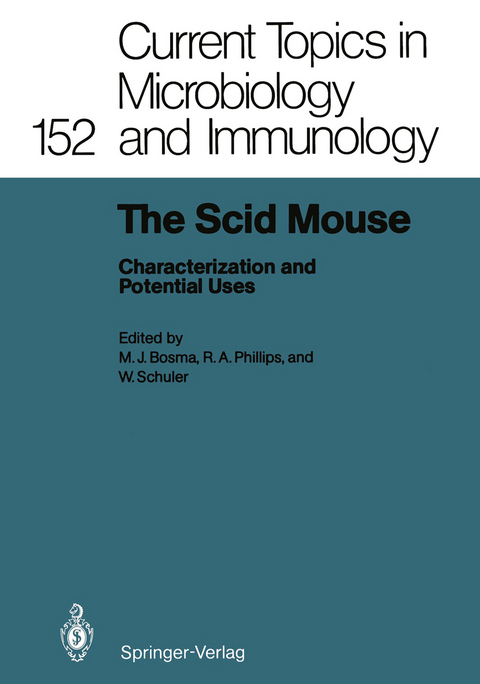
The Scid Mouse
Springer Berlin (Verlag)
978-3-642-74976-6 (ISBN)
During routine genetic screening of several immunoglobulin heavy chain congenic mouse strains in 1980, one of us (MB) was surprised to find that several mice in the C.B-17IIcr strain, which was being maintained in a specific-pathogen-free facility of the Fox Chase Cancer Center (Philadelphia, PA), did not express serum immunoglobulin of the appropriate allotype. Fearing an error in the breeding of these mice, the sera of the suspect mice were screened for other allotypes. When these tests revealed a complete absence of serum immunoglobulin, it became apparent that a mutation had probably occurred in the C.B-17IIcr line. Further analysis revealed that a single breeding pair was respon sible for all of the immunoglobulin negative mice and that the defect showed recessive inheritance. Thus was the C.B-17/Icr scid or severe combined immune deficient (scid) mouse discovered. Although it has taken most animal facilities several years to breed scid mice of high quality for experimental purpose, it was clear by 1987 that many investigators were beginning to exploit the unique qualities of the scid mouse for studies in several areas.
I. General Phenotype/Cellular Characterization.- The scid Mutation: Occurrence and Effect.- Pleiotropic Effects of the scid Mutation: Effects on Lymphoid Differentiation and on Repair of Radiation Damage.- Analysis of Lymphoid Population in Scid Mice; Detection of a Potential B Lymphocyte Progenitor Population Present at Normal Levels in Scid Mice by Three Color Flow Cytometry With B220 and S7.- Phenotype and Differentiation Stage of Scid Mouse Thymocytes.- Growth Requirements of B Lineage Lymphocytes From Scid and Normal Mice.- Defect of Scid Mouse Revealed in In Vitro Culture Systems.- Natural Killer Cells and Their Precursors in Mice With Severe Combined Immunodeficiency.- II. General Phenotype/Molecular Characterization.- Nature of the scid Defect: A Defective VDJ Recombinase System.- Rearrangement of T Cell Receptor Delta Genes in Thymus of Scid Mice.- Abnormal V(D)J Recombination in Murine Severe Combined Immune Deficiency: Absence of Coding Joints and Formation of Alternative Products.- The scid Mutation Disrupts Gene Rearrangement at the Rejoining of Coding Strands.- The Effect of the scid Mutation on Mechanism and Control of Immunoglobulin Heavy and Light Chain Gene Rearrangement.- III. Introduction of Functional Ig or TCR Transgenes.- The Utilization of the scid Mutation in the Study of T Cell Development.- Transgenic Scid Mice With a Functionally Rearranged Immunoglobulin Heavy Chain Gene.- IV. Leaky Phenotypes.- T Cell Leakiness in Scid Mice.- Limited Clonal Diversity of Serum Immunoglobulin in Leaky Scid Mice.- Pauciclonal B Cell Involvement in Production of Immunoglobulin in Scid Ig+ Mice.- V. Potential Uses: Engraftment with Syngeneic Mouse Cells.- Reconstitution of Scid Mice by Injection of Varying Numbers of Normal Fetal Liver Cells into Scid Neonates.-Reconstitution of Lymphocyte Subsets in Scid Mice by Transplantation of Fetal Primordia.- Use of the Scid Mouse Tranplantation System in Studies of Lymphocyte Differentiation.- The Scid Mouse as a Model to Identify and Quantify Myeloid and Lymphoid Stem Cells.- VI. Potential Uses: Engraftment with Human Tissues and Cells.- The Scid-hu Mouse: Current Status and Potential Applications.- Studies of HIV Infection and the Development of Epstein-Barr Virus-Related B Cell Lymphomas Following Transfer of Human Lymphocytes to Mice With Severe Combined Immunodeficiency.- Human Lung Tumors, Patients' Peripheral Blood Lymphocytes and Tumor Infiltrating Lymphocytes Propagated in Scid Mice.- Adoptive Transfer of Human Peripheral Blood Lymphocytes (PBL) in Scid Mice.- Establishment of Assays for Human Hematopoietic Cells in Immune Deficient Mice.- VII. Potential Uses: Model For Studies of Immune Function.- Scid Mice in Reproductive Biology.- T Cell-Independent Macrophage Activation in Scid Mice.- Pneumocystis carinii Pneumonia in scid/scid Mice.- Immunobiology of Bone Marrow Transplantation: Studies Using Scid Mice.- Growth of Human Tumors in Immune-Deficient scid Mice and nude Mice.
| Erscheint lt. Verlag | 6.12.2011 |
|---|---|
| Reihe/Serie | Current Topics in Microbiology and Immunology |
| Zusatzinfo | XII, 263 p. |
| Verlagsort | Berlin |
| Sprache | englisch |
| Maße | 170 x 242 mm |
| Gewicht | 483 g |
| Themenwelt | Medizin / Pharmazie ► Medizinische Fachgebiete ► Dermatologie |
| Medizin / Pharmazie ► Medizinische Fachgebiete ► Onkologie | |
| Medizin / Pharmazie ► Physiotherapie / Ergotherapie ► Orthopädie | |
| Schlagworte | AIDS • Biomedizinische Technik • Bone • HIV • Immunobiology • Immunschwäche • Leukämie • Thymus • tissue • Transplantation |
| ISBN-10 | 3-642-74976-3 / 3642749763 |
| ISBN-13 | 978-3-642-74976-6 / 9783642749766 |
| Zustand | Neuware |
| Haben Sie eine Frage zum Produkt? |
aus dem Bereich


